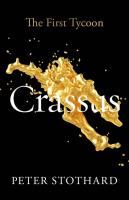
Yale (2022) h/b 184pp £18.99 (ISBN 9780300256604)
Julius Caesar and Mark Antony live on, thanks to their rivalry, their dual infatuation with Cleopatra, and of course Shakespeare. But the third man in the triumvirate that grabbed power from the collapsing Republic is almost forgotten now. But he wasn’t forgotten, or forgiven, by his fellow Romans for his ignominious defeat, indeed wipe-out, by the Parthians at the battle of Carrhae (53 BC).
Peter Stothard, the former Times and TLS editor, has followed his previous reconstructions of the Spartacus revolt (2010) and Caesar’s assassination (2020), with this slim but lively biography of Crassus, the first for fifty years. Before that we have only really Plutarch who treated his life as a morality tale. S.’s account is equally unsympathetic but much more readable, using his journalistic eye to frame Crassus in his time and context.
So who was Crassus, how did he force his way onto the podium, and why does he matter? His career was forged in the brutal power struggle between Marius and Sulla in the 80s BC. His father, a governor of Spain, committed suicide to avoid execution by Marius’s troops; his two brothers were killed. Crassus himself fled to hide out in Spain. Returning he joined up his small army with Sulla, and helped him win the crucial battle for Rome at the Colline Gate.
His revenge on the Marians was taken in property, not blood. He built a vast and sprawling portfolio, buying up the houses and estates of the condemned, adding slaves and mines to his father’s wealth. He learnt to manage slaves like soldiers, organising them as both white and blue collar: slaves were rent collectors, property managers, taxmen and bookkeepers as well as labourers, tradesmen and bailiffs. He ran Rome’s first fire service, but one available only to subscribers.
S. labels Crassus ‘the first tycoon’. It wasn’t just about wealth. Crassus was ruthless in building his political powerbase, bribing his way through the courts and public offices to establish an extraordinary network of clients and dependants. And he was ready to serve the state: when the consuls failed to check the great slave revolt of 73 BC, it was Crassus who raised five legions the following year to crush Spartacus and crucify over 6,000 prisoners on the Appian Way. He got an ovatio rather than the full triumph, which was awarded to Pompey for his victories in Spain, but both were elected to the consulship for 70. Pompey, five years his junior, was ambitious for further commands and got them, ridding the eastern Mediterranean of pirates and establishing a buffer zone of client kingdoms between Rome and Parthia further east. Crassus, by contrast, went back to business and banking, including loans to the much younger Caesar, then campaigning in Gaul.
Pompey’s return in 62 BC saw the triumvirate at its height. Pompey’s victories were ratified and celebrated; Crassus’ tax-gathering contracts were renegotiated. Their conference at Luca saw the triumvirate formally recognised. With Caesar away campaigning (invading Britain and modern Belgium), Crassus and Pompey became consuls again in 55. Each was given extended five-year commands: Pompey back in Spain, Caesar extending Rome’s grip on Gaul, and a new mandate for Crassus himself in Syria and the Middle East. Pompey had already enjoyed two triumphs, and had successfully conquered the Near East. Now Parthia was in Crassus’ sights, and indeed Bactria, India beyond. He too could play the New Alexander.
The triumph he so badly wanted from there was not to be his. He prepared extensively, organising and financing seven legions, 35,000 men, and took them through Macedonia into Galatia, then onto Syria. Ignoring advice to circle through Armenia he crossed the Euphrates in 54, and enjoyed early victories against the Parthians before wintering again in Syria. Crossing again in 53, and heading for Seleucia (near Babylon), he was trapped and roundly defeated at Carrhae (in modern Turkey). His severed hands and head, its mouth allegedly stuffed with gold, were delivered to the Parthian king. Caesar was preparing a campaign to recover the seven lost eagles when he was assassinated in 44BC; it was another quarter of a century before Augustus was able to negotiate their return. Augustus learnt the lesson: Parthia was a conquest too far. He advised his successor Tiberius to keep the empire within its existing bounds.
Crassus wasn’t the first or last ambitious westerner to come to grief in Mesopotamia. He was undone, S. and Plutarch agree, by both greed and ambition. Had he stuck to his banking and property, he could have played the major role beside his protégé Caesar after Pompey’s murder in Egypt. But this was the chaos and disorder of post-Republican Rome: just twelve years after they carved it up between them at Luca, all three of them had met a violent end.
Sir Michael Fallon
Defence Secretary 2014-17
